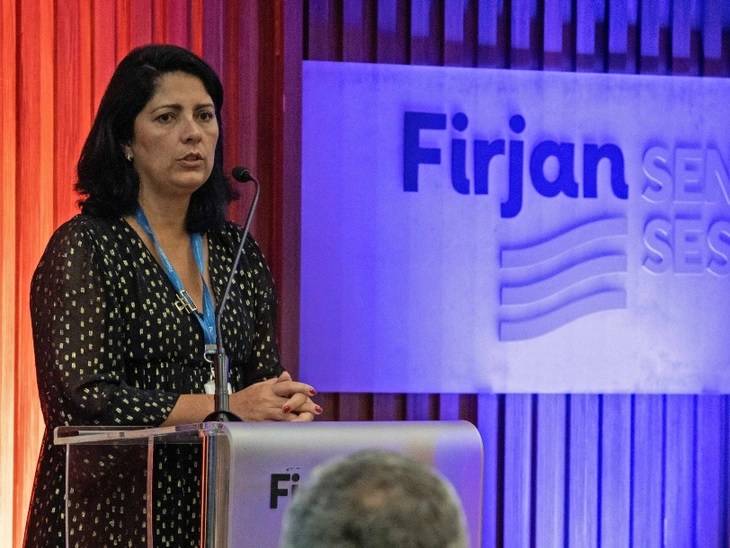
Organized by the Federation of Industries of the State of Rio de Janeiro (Firjan), the event brought together business leaders, public authorities, and maritime industry experts.
T&B Petroleum/Press Office Firjan
The launch of the 6th edition of the Panorama Naval in Rio de Janeiro, a biennial publication by Firjan SENAI SESI, highlighted the strategic importance of the market for the economy of Rio de Janeiro. The event, held at the headquarters of the Federation of Industries of the State of Rio de Janeiro (Firjan) on August 20th, brought together business leaders, public authorities, and experts to discuss the recent advances and future challenges of this industry in Brazil. With a focus on the potential recovery of this market and how the state can strengthen its global position, the ceremony emphasized the relevance and prospects for naval revitalization.
Download the 6th edition of the Panorama Naval in Rio de Janeiro via the link, click here!
Karine Fragoso (photo), General Manager of Oil, Gas, Energy, and Naval at Firjan, stated that the publication is a valuable resource for the maritime market and for those who wish to work in this segment. She mentioned Firjan SENAI SESI units dedicated to professional training and specialization in Regulatory Standards, underscoring their commitment to the oil and gas supply chain in Rio de Janeiro.
Sérgio Bacci, President of Transpetro, spoke about the fundamental role of the federation in supporting the market: "It is an honor to see the shipbuilding industry receiving Firjan's support. This event is crucial for the sector, which faced difficult years after reaching its peak." He highlighted the TP25 Program, which foresees the contracting of new vessels, and Transpetro's commitment to technological innovation. "The TP25 will propel the company into the future, creating growth prospects and a more sustainable fleet," he explained.
Representing maritime navigation, Lilian Schaefer, Executive Vice President of the National Union of Navigation Companies and the Brazilian Association of Maritime Support Companies (Syndarma/Abeam), emphasized the publication's role in the shipbuilding industry’s recovery. "Today, we are experiencing a new cycle of growth. The market survived a severe crisis, and now we are in a phase of revitalization," said Lilian, who also highlighted the importance of the maritime regulatory framework and the industry's ongoing contribution to economic development.
Public and Private Representatives
Admiral José Luiz Canela, Superintendent of Research and Postgraduate Studies at the Naval War College, addressed the issue of training and qualification. "The Brazilian Navy continuously invests in the qualification of its personnel. We are committed to enhancing maritime awareness and integrating society into this debate," Canela said, emphasizing the importance of the Naval War College and the Structural Postgraduate Program (PPM) in promoting excellence in the market.
Luiz Gustavo Cidade, CEO of BioRen, shared insights on technological innovation in the industry. "Our technology, developed to combat biological fouling, is aligned with environmental requirements and has shown promising results." Cidade also highlighted the installation of this technology on ships and drilling rigs, underscoring its importance for the efficiency and sustainability of operations.
Jones Soares, Director of Maritime Transport at Transpetro, emphasized the need for a strategic approach. "We must have the courage to discuss our national project. The shipbuilding industry is at the core of the maritime economy and should be a strategic focus within the national project. We have the potential to restore a thriving industry and become a truly sovereign and developed country."
Vinicius Patel, Director of Port Administration at Porto do Açu, mentioned the importance of connecting industry and sustainability. "We are witnessing a significant transformation in the blue economy. Porto do Açu, responsible for 40% of oil transportation in Brazil, faces challenges but also offers great opportunities, such as steel recycling. It is crucial to maintain an efficient circular economy and overcome economic volatility and bureaucracy to ensure sustainable growth."
The launch event organized by Firjan SENAI SESI not only highlighted the continued importance of the shipbuilding industry to the state's economy but also served as a starting point for new discussions about the future. By bringing together business leaders and experts for an in-depth analysis, the event reinforced the federation's commitment to supporting the recovery and growth of the shipbuilding industry.

Contact us